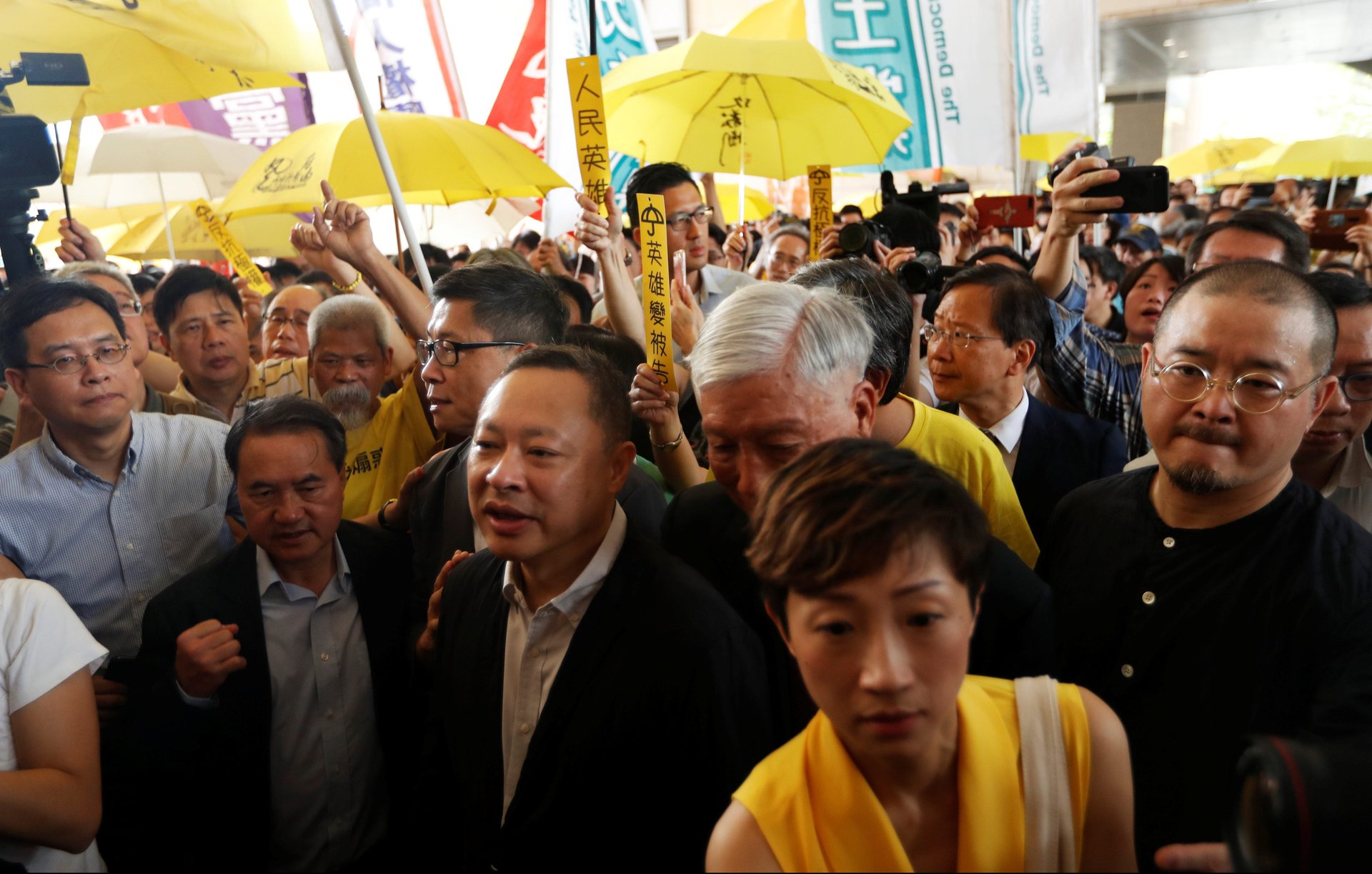Hong Kong is sending its “Umbrella 9” democracy leaders to prison
A Hong Kong court today (April 24) handed down prison sentences to leaders of the city’s pro-democracy Occupy protests, which paralyzed large swathes of the territory for 79 days in 2014.


A Hong Kong court today (April 24) handed down prison sentences to leaders of the city’s pro-democracy Occupy protests, which paralyzed large swathes of the territory for 79 days in 2014.
The co-founders of the protests, also known as the Umbrella Movement for the shield demonstrators used to guard against pepper spray and tear gas, were convicted of public nuisance charges two weeks ago, punishable by up to seven years in prison. Six other defendants, making up the so-called Umbrella 9, were found guilty of inciting others to commit public nuisance.
Legal scholar Benny Tai and retired sociology professor Chan Kin-man were both sentenced to a total of two years—16 months for one charge, and eight months for another, but these will be served concurrently. Reverend Chu Yiu-ming will face 16 months in prison, suspended for two years due to his health and age.
District court judge Johnny Chan said the public never received the apology that it deserved from the defendants, and that none of them had expressed regret. In making his judgment earlier this month, the judge said the demonstrations had resulted in “unreasonable obstruction,” thereby exempting the leaders from legal protections of peaceful demonstration.
Chan also rejected the Occupy leaders’ argument that the protest was an appropriate exercise of free speech because they knew the demonstrations would “impinge unreasonably upon the rights of others.”
Another defendant, lawmaker Tanya Chan, had her sentencing postponed till June 10 after her lawyer informed the court that she is suffering from a life-threatening brain condition requiring an urgent operation.
Meanwhile, activist Raphael Wong and lawmaker Shiu Ka-chun were give eight-month jail terms, to be served immediately. Former student leader Eason Chung and pro-democracy veteran Lee Wing-tat were sentenced to eight months in jail, suspended for two years. Another former student leader, Tommy Cheung, was ordered to complete 200 hours of community service within a year.
While far short of the maximum possible punishment, today’s jail sentences represent a significant blow to the city’s faltering democracy movement.
“The Umbrella 9 did nothing but peacefully press the Hong Kong government to fulfill its obligation to deliver genuine democracy to people in the territory, and they should not have been prosecuted in the first place,” said Maya Wang, a China researcher with advocacy group Human Rights Watch in Hong Kong.
In 2017, three student leaders of the Umbrella Movement, including Joshua Wong, were sentenced to prison.
Hong Kong, a former British colony, was promised autonomous political rights under a “One Country, Two Systems” arrangement after it returned to Chinese rule in 1997, with its own government and legal system. Pro-democracy activists have long pushed for more democracy, including direct elections for the city’s leader. The Occupy protests were called in response to a decision handed down by Beijing in 2014 that any election held to elect Hong Kong’s leader can only include candidates that it has vetted.
Since the end of the Umbrella Movement, the democratic camp has suffered a string of dramatic defeats, including the removal of six lawmakers from the legislature and the barring of young activists from seeking office. The Hong Kong National Party, a group that calls for the city’s independence from China, was also banned last year—the first time since the handover from British rule that a political party had been banned in Hong Kong.